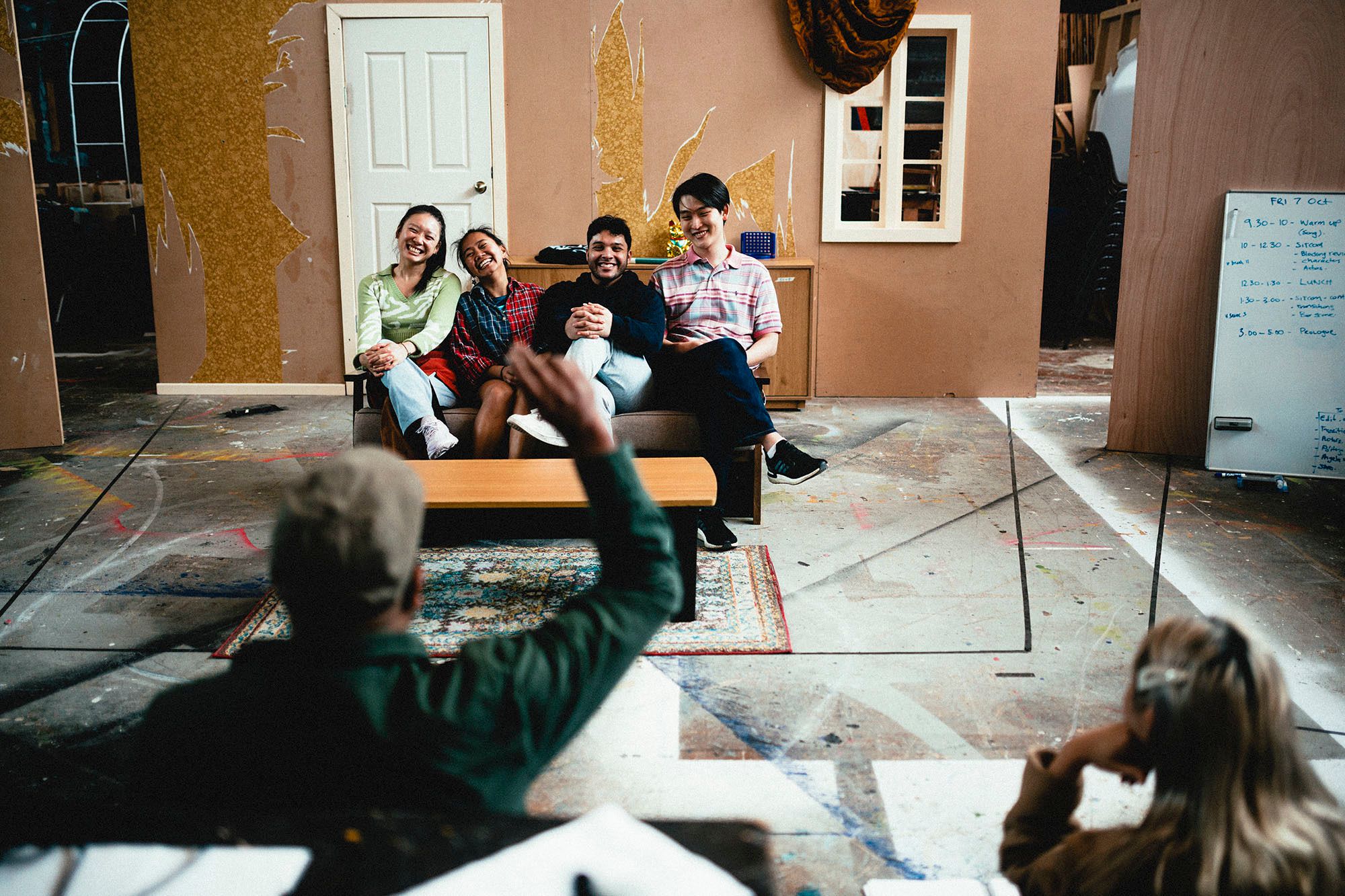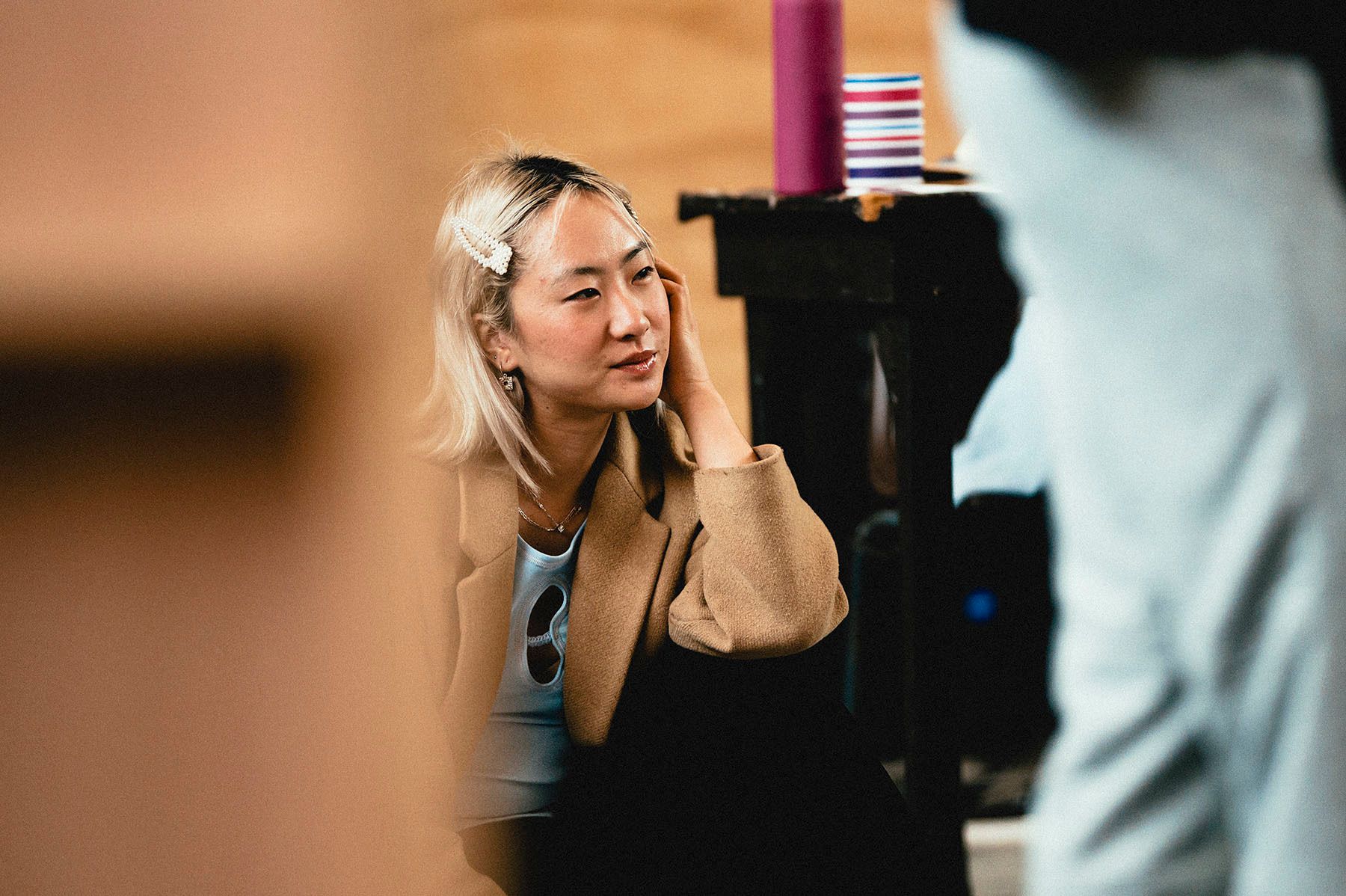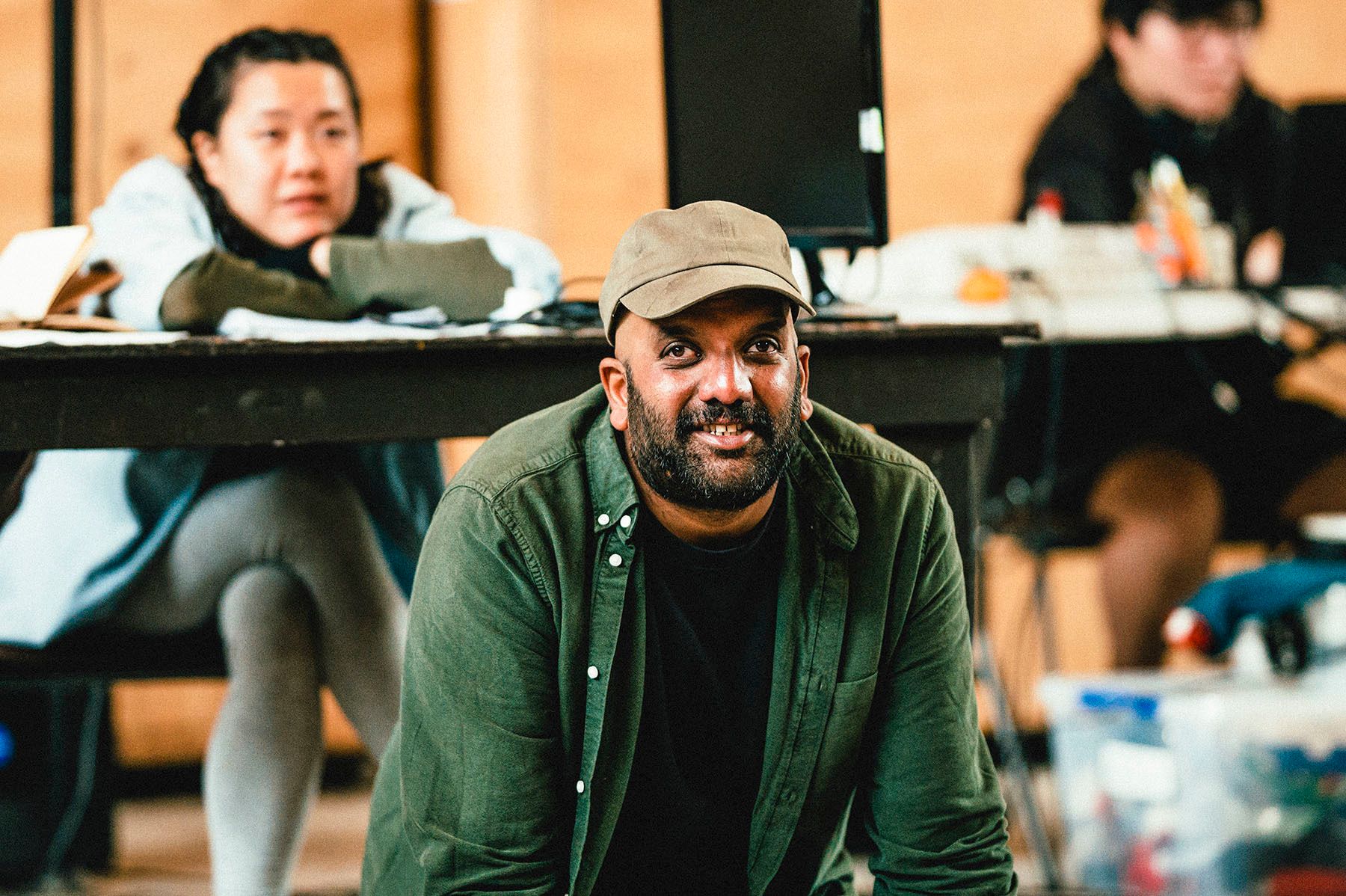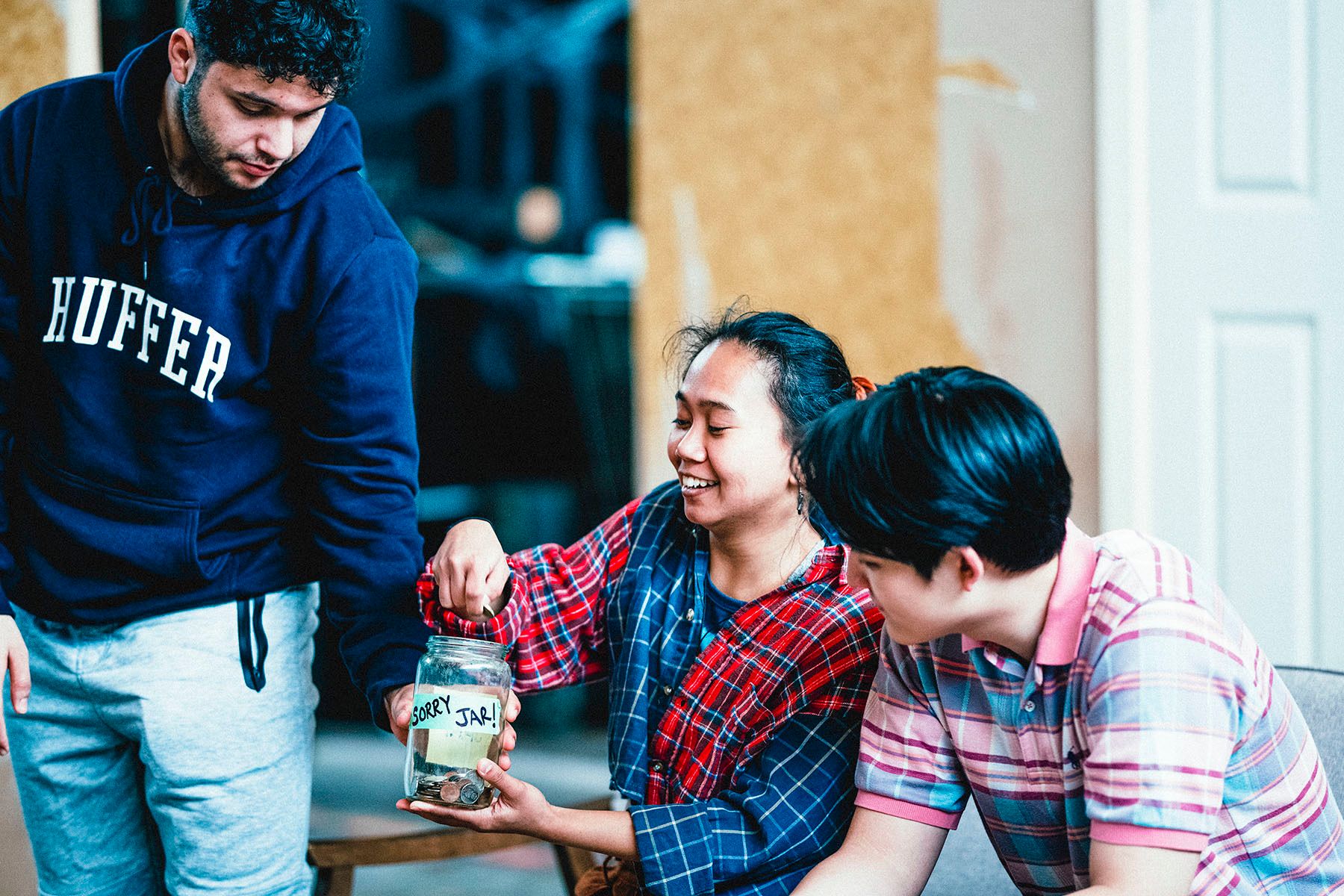EVERYONE IS A DIVERSITY HIRE
Asian art is having a moment in Aotearoa. Nathan Joe unpacks the complexities in the production of representation through The First Prime-Time Asian Sitcom, by Silo Theatre.
The First Korean-Authored Play Produced by Silo Theatre. The First ‘Pan-Asian’ Play produced by Silo Theatre. The First Live Production of an East Asian Play by Silo Theatre. The first Korean Play Produced by a Mainstage Theatre Company with an All-Asian Cast in Aotearoa.
Naming the intersections of something helps us better understand how it fits into the landscape and, ideally, embrace its multiplicity. But while these qualifiers are an attempt to celebrate or categorise a landmark, they also have the dual effect of breaking down the achievement until it’s practically meaningless. Silo Theatre’s final production of 2022, The First Prime-Time Asian Sitcom,knowingly toys with this notion in its very name and form.
The sitcom has historically been a haven for the average citizen to retreat into, a relatively apolitical and unchallenging space to indulge in the lives and setups of others. For a millennial like myself, Friends is probably the apotheosis of the form. Sitcom as nostalgia. Sitcom as comfort food. Sitcom as relief. Sitcom as family. An inherently artificial genre, the very antithesis of authenticity, with its mugging to camera, laugh tracks and punchlines. It’s no coincidence the sitcom, in the real world, has been the genre Asians have found some of the most success breaking into. From Fresh off the Boat, Kim’s Convenience, The Family Law and Aotearoa’s very own Raised by Refugees. After all, the sitcom provides a safe way to present Asianness as not too radical. Not always, but often, the half-hour episodic format can provide a streamlined version of the ‘Asian experience’ at the expense of cultural nuance.
After all, the sitcom provides a safe way to present Asianness as not too radical
Like the Showrunner in Prime-Time, playwright Nahyeon Lee has chosen the sitcom as a vehicle to Trojan horse her audience with big ideas and debates. And like any good Trojan horse, Prime-Time does a convincing job of replicating its vessel. The sitcom within the play is something of an uncanny valley, in that it has all the markers of the real thing yet feels off. Rather than go for crude parody, there is something eerily on point about its construction. Sometimes the best way to critique something broken isn’t to make fun of it, but to honour it and all its flaws, to let its failures and limitations speak for themselves. After all, can satire even pack a punch in a post-Trump world?
The play works best when we can feel the form of the sitcom struggle against the politics of the Showrunner, and the politics of the playwright by proxy. How political can the sitcom be? How political should art be, should Asian art be? If art tends towards either painting a picture of how the world is, or how the world could be, Prime-Time throws us into the world of the former. A world where authenticity is just another form of commodification, something we brand ourselves by. Lee is “very aware that our traumas can be commodified into these consumable pieces” and observes that her play is “a really cynical and scary thing to unleash into the world. But, to be honest, the world is uglier and scarier than my play.”
Playwright Nahyeon Lee in rehearsal. Credit: David St George Photography
Asian New Zealanders writing for our mainstages are still a relatively recent phenomenon. The earliest examples date back to Lynda Chanwai-Earle’s Ka-Shue (Letters Home) in 1996 and Jacob Rajan’s Krishnan’s Dairy in 1997. This first wave of Asian stories might be defined by their strong immigrant narratives. A crude oversimplification, but one that is useful for understanding how the landscape has shifted towards the topic of claiming (or reclaiming) Asianness in a Western context (see Orientation, or Scenes from a Yellow Peril), or plays where Asianness is just a given and needn’t explain itself (see My Heart Goes Thadak Thadak, Boom Shankar). It is because of this first wave that companies like Proudly Asian Theatre exist, where Prime-Time was first developed as part of their Fresh Off the Page programme. As much as Prime-Time is about the screen industry, it’s also a love letter to all Asian creatives and the plays that have come before it, a peek behind the curtain into the fraught personal politics of making something that inevitably speaks on behalf of your whole community.
I never wanted to be an Asian writer. My first plays were mostly in violent opposition to my Chineseness. Early flirtations with ‘Asian’ writing were often uncomfortably twisted and taken out of my control, the point often missed entirely. If I started writing during a period in which Asian art was decidedly uncool, I grew into a period where it started to gain cultural capital. My Asianness and Queerness have admittedly both opened up a lot of doors in the last few years. Ironically, the same doors that were previously closed to me for the very same reasons.
In my early days as a playwright, I thought the answer lay somewhere in rejecting my culture outright. I lived in denial, and wrote plays that were impossible to project or read my Asianness into. My ambition was just to write a good play, rather than a good ‘Asian’ play. If you squinted hard enough, perhaps you could see the ways in which this writer was attempting to annihilate the self through writing his race out of existence. Playwright Nahyeon Lee identifies as Korean, raised in Tāmaki Makaurau. Based on its author, Prime-Time promises at least a modicum of authenticity and lived experience for its audience. And yet, this authenticity is not a given. The very topic of the play is authenticity, and who decides what is authentic.
The very topic of the play is authenticity, and who decides what is authentic
Prime-Time posits that artists are often caught between two choices: to use the tools of the master’s house or to not build anything at all. By highlighting these two limited choices, it reveals a bigger broken system in which the idea of radically reimagining new ways of working often feels impossible.
While the paradigm has currently shifted in favour of programming Asian work, that isn’t without complications. The arc of progress isn’t linear or guaranteed permanence. No matter how hard you try, being an Asian writer today comes with a series of expectations. It’s the same battle that the characters in Lee’s play contend with – realising they can’t outrun their identities, and are better off wielding their Asianness as a weapon, a weapon of survival, while they still can.
Director Ahi Karunaharan in rehearsal, creator of My Heart Goes Thadak Thadak (Silo Theatre, 2019). Credit: David St George Photography
Silo Theatre’s programming has always been curated and motivated by a deep desire to produce shows that reckon with the very nature of what contemporary theatre is and can be. From the community choirs of The Events to the television studio of Hudson and Halls, Silo’s brand taught me what contemporary theatre could be. As an emerging maker, it was deeply aspirational viewing. But, like most of my aspirational viewing, I never saw myself in it or could ever imagine actually being a part of it.
To the knowledge of the current team, notwithstanding some of the early years of the company prior to 2005 which are currently unarchived, this is the first East Asian play programmed by Silo Theatre to have a fully-fledged live production.1 While it feels overdue, it’s a self-aware better-late-than-never. It’s no accident that Prime-Time is directed by Ahi Karunaharan, creator of Silo’s first play by a South Asian writer and director, the first ever documented Asian play programmed by them (the aforementioned My Heart Goes Thadak Thadak). And it’s easy to see why this show would slot into the 2022 programme, an appropriate follow-up to the similarly metatextual The Writer. While The Writer sees playwright Ella Hickson in direct conversation with British theatre culture, Prime-Time sees Lee in direct conversation with the screen industry in Aotearoa.
Though Hickson has described The Writer as an argument with herself, the viewpoints of the male characters (Director and Boyfriend) in the play make for easy antagonists for the audience to root against. Prime-Time doesn’t give us such an easy anchor, giving us no clear enemy or representative. The antagonist is a whole system, and the arguments are from within the community. It turns out the worst critics are not the straight white males as in The Writer, but the people who look just like you. That’s where the criticism burns. The voices you can’t shrug off as simply not getting it.
The best of the play’s lines are written with the profound urgency of someone desperate to say something before they chicken out. As Lee herself says, “This could be my first and last play with a mainstream theatre company.” It’s this urgency that gives it something beyond dialectic. It gives that feeling of real-time reflexivity, the gears turning and cranking towards something being solved and debated right now. You can feel the arguments pressing against the margins of the page, worming into your brain, demanding to be taken seriously. A heated internet debate made flesh. This is the same urgency I imagine most Asian writers feel when given opportunities of scale. It is the burden of the minority to feel they are writing for their whole community. It is the tragedy of the minority that this is an impossible task – the double bind of capitalism to feel your first opportunity might be your last and only opportunity to ever say something meaningful.
L to R: Actors Jehangir Homavazir, Ariadne Baltazar and Uhyoung Choi in rehearsal. Credit: David St George Photography
Self-reflexive art begs the question: Why should the average audience member care about the politics behind production? Because art matters. Because art is the soft power that shapes the way we see the world and see each other. Lee borrows from Anamik Saha for the epigraph of her play: “Switch the question from how cultural industries represent race, to how cultural industries make race”. At the heart of the play is a conversation about the way art and commerce are inextricably bound together. It asks for us to better understand the world and conditions in which this art is made. So that maybe, just maybe, we might change it.
“Switch the question from how cultural industries represent race, to how cultural industries make race”.
The first Asian anything is always going to be a statement piece. As I write this essay, I’m privileged to sit in for a rehearsal of The First Prime-Time Asian Sitcom. It’s early in the process, but I’m struck by the unique phenomenon of an all-Asian cast. As the Showrunner says in Prime-Time, “None of you are diversity hires, and everyone is a diversity hire.” Despite my recent experiences in Asian-led spaces, this is still a rarity in Aotearoa. Still a novelty for me. It’s spaces like these where questions can be asked without fear of insidious subtext. There is a baseline of shared experiences where you meet as Asian creatives. And from that baseline of shared experiences, a shorthand and empathy are developed.
To see Asian actors being given permission to speak freely to the text. To investigate it on their own terms. And to bring every inch of themselves into the project.
The stakes in the play are not simply dramatic ones, but things the cast are going through by sheer existence alone. This is a rehearsal room where the actors are demanded to engage in discourse about the type of work they are making and the responsibilities of it. The play’s dramaturgy is reflected not just in the structure of the play, but the process in which it is made. And perhaps it is in the discussions, in the margins of the play, that revolution can be discovered. If the values of the work aren’t being met in the process of making it, then what’s the point of ‘authentic’ storytelling? Anything less is hypocrisy. Recent controversies surrounding both Fresh off the Boat and Kim’s Convenience, where actors revealed workplace racism, throw this necessity into harsh light.
I’m reminded of Sarah Ahmed’s notion that to complain about the state of things is a political act; to complain is to become acutely aware of the gap between how things are and how you wish them to be. While the title of Lee’s play is both celebration and lament, a sigh of gratitude and a disgruntled cry of disbelief, it understands that to be celebrated and tokenised in the same breath is better than not being celebrated at all.
Prime-time longs for a reality different to the one we live in, promising that when Asian art is finally in abundance in the Western world, these conversations might become irrelevant. To walk into a room full of Asian actors won’t be awe-inspiring. Maybe it’ll even be boring. What a sight that will be.
1 Black Tree Bridge by Chye-Ling Huang was presented as a reading as part of Silo’s Working Title Series in 2016. Break Bread, co-created by Alice Canton, was presented online in 2021.
*
This piece is presented as part of a partnership with Silo Theatre and appears in the show programme.
Silo covers the costs of paying our writers and team while we retain all editorial control.





